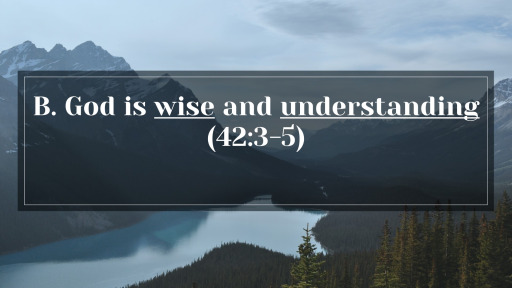Now My Eyes See You

I. If you would respond to God as Job did you must SEE God as Job saw Him.
A. God is Sovereign and Free (42:2)
“Anyone who cannot undertake God’s works has no right to undermine God’s ways. And anyone who trembles at the sight of fierce beasts is unwise in boldly contending with the beasts’ Maker.” That is why Job acknowledges God’s undiluted right and ability to do whatever He purposes or pleases.
Kind people, wanting to console, made the usual observation: “It is very hard to see how this can be for the best.” “We are not asked to SEE,” said Amy. “Why need we when we KNOW.” We know—not the answer to the inevitable Why, but the incontestable fact that it is for the best.… Others, with a sigh and a shake of the head, observed that it is difficult for us human beings to escape bitterness, even dumb rage, when such things happen. “It is indeed not only difficult, it is impossible,” Amy wrote. “There is only one way of victory over the bitterness and rage that come naturally to us—To will what God wills brings peace.”
B. God is wise and understanding (42:3-5)
II. If you would respond to God as Job did you must SUBMIT to God as Job did.
A. Job retracted all his charges
B. Job repented in dust and ashes
Any stranger to that dust has not yet seen God for Who He is, however much he may know about Him
We understand ourselves best and deepest not when we peer within but when we gaze on God and come to see Him more fully as He is. And we can see God as He is only if and when He reveals Himself to us.
The degree to which we will respond as Job did depends upon the degree to which we see and submit to what Job saw.